
(1921-2004)
Dr. Fernandez Guardiola was the founder of the Division of Investigations in Neurosciences of our institute in 1983 and was the subdirector until 2003.
During this time, he collaborated with professors Robert Naquet, Raul Hernandez Peon and Carlos Guzman Flores among others.
Since 1957 he was a professor and investigator of the School (today Faculty) of Psychology of U.N.A.M and was named Profesor Emerito in 1993.
In June of 1993, he was named National Emeritus Investigator for the National System of Investigators.
He received the National Award of Sciences and Art in 1999 in the field IV Sciences Physic-mathematics and Natural Science.
His scientific work includes 169 papers published internationally with a very stringent editorial committee, 31 informative articles, 13 monographs, 5 books two of which were translated and supervised more than 30 thesis.
He received the Dr. Manuel Camelo National Award of Psychiatry in 1987.
Dr. Fernandez died in May 1987.
Lines of Work for the Manuel Camelo Foundation Award of 1987
One of the areas of investigation since 1982 that has been developed in the laboratory of Contol an Regulations (before known as Neurophysiology) in the National institute of Psychiatry has to do with the development of methods of analysis of signals in real time. These lines have resulted in various original publications in both the field of computing program development “software” and systems analysis “hardware”. These have resulted in the design of measuring and analysis of made-to-order equipment according to the needs of research laboratories of neurophysiology of the peripheral and central nervous system.
The analysis needs of this type of laboratories are very specific, and many times there is no commercial equipment that will fit the experimental protocols of such laboratories. That is the reason that this laboratory has designed specialized equipment in these protocols, and this equipment has also been installed in different laboratories both nationally and internationally.
The publication that earned the Manuel Camelo Foundation award in 1987 includes experiments that determine the propagation dynamics of epileptic discharges generated in the amygdalae of the limbic system of animals. These experiments consisted of the repeated low-intensity stimulation (kindling model) of some structures of the limbic system and, after a few days, resulted in a generalized convulsive crisis in the animals subjected to the protocol. The process is irreversible and permanent.
In this work, specialized equipment was designed and built to register the cortical electroencephalographic activity in cats with the objective to represent in color the electric activity of the animal cortex during this experimental epileptic procedure (kindling).
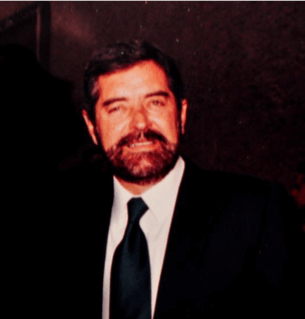
Dr. Juan Ramon de la Fuente Ramirez has had an outstanding professional development in both the academic and public sector. He studied at the Faculty of Medicine at UNAM (Autonomous University of Mexico) and has been a professor there since 1980 and was dean from 1990 to 1994. He made his post-graduate studies at the Mayo Clinic in Rochester, Minnesota, and was recognized as a distinguished student in 1996.
As a professor and investigator, he wrote more that 250 papers which were published in various international reviews, and has written 17 books on investigation, health and educational topics. He was Mexican Health Secretary from 1994 to 1999 and dean of the University of Mexico (UNAM) from 1999 to 2007.
Dr. de la Fuente has been president of the Mexican Academy of Science and the Mexican Academy of Medicine and has received various awards including the National Award of Sciences and Arts and the Mexican Scientific Research Academy Award. He is Doctor Honoris Causa for several universities in various locations, such as Montreal, Havana, Lima, Colombia, Sinaloa (Mexico), Santa Domingo, Cordoba (Argentina), Moscow, Alcala and the UNAM. He has been a patron of the Cervantes Institute and was decorated in Spain with the Gran Cruz de Isabel la Catolica . He was president of the United Nations council against AIDS (ONUSIDA) and president of the First Encounter of Iberoamerican University Rectors.
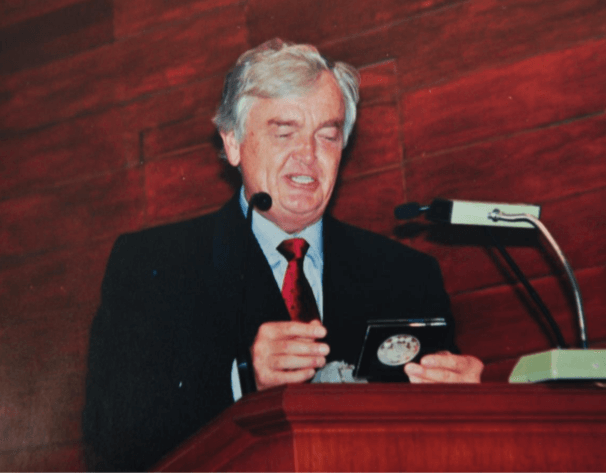
Dr. Heinze Martin was born in Goeppingen, Germany, and obtained Mexican citizenship in 1958. He studied at the Faculty of Medicine at the Mexican National Autonomous University (UNAM) and did his rotational internship in Canada. In 1968, he received his surgical degree from the Autonomous University of Mexico (UNAM). He did his residency in psychiatry at the Spanish Hospital in Mexico and received his psychiatry degree from UNAM.
He received a scholarship from CONACYT in 1973 and 1974 to do his postgraduate studies in clinical pharmacology in the psychiatric institute of the University of Munich in Germany. He received his master’s degree in medical psychotherapy from the Faculty of Medicine of the UNAM.
In his long professional career, Dr. Martin has had different responsibilities at the National Institute of Psychiatry “Ramon de la Fuente Muniz” including head of the Psychopharmacology Department, head of the Clinical Services Division and general director in 1998 and in 2008. Since 1972, he has been the head of the Psychiatry and Mental Health Department of the Medicine Faculty of UNAM and has taught under- and post-graduate studies. He has conducted more than 160 courses and workshops in and outside of UNAM and, as a member of the tutorial committee, he supervised 35 specialty theses 10 of masters degrees and 4 of doctorate degrees. He has also participated as president or vocal in different professional exams.
In the field of research, he investigated the major depression disorders, such as bipolar and anxiety, and coordinated on multiple research projects.
He is author of and co-author of more than 26 book chapters, 82 national and international indexed scientific reviews, 50 articles in related magazines and more than 20 articles for educational purposes. He has also edited and co-edited 3 books, and his publications have generated more than 1720 references in national and international reviews, 70 of which have more than 110 references. He is a level two national researcher (SNI).
He has been an outstanding participant in academic events. He has lectured in more than 350 national and international congresses, magisterial conferences, and symposiums. He has been a member of national and international editorial committees which include Integrative Psychiatry, Revista Argentina de Psiquiatria Biologica, Revista Chileana de Neuropsiquiatria, Revista Neuropsiquiatria del Colegio Venezolano, Journal of Neural Transmission, Actas Espanolas, Salud Mental, Die Psychiatrie and the editorial board of the Current Opinion in Psychiatry Review.
Dr. Martin is a member of more than 30 academic associations among which are the Mexican Psychiatry Association, International College of Neuropsychopharmacology, World Association of Psychiatry, American Psychiatric Association, American College of Psychiatrists, World Association of Biological Psychiatry, Iberoamerican Association of Neurosciences and Mental Health. He is also an honorary member of the German Society of Psychiatry.
He has been president of the Mexican Council of Psychiatry, the National College of Psychiatrists, and the Mexican College of Neuropsychopharmacology. He is a member of the National Academy of Medicine and was president of the department of medicine in 2013-2014.
At present, he is the coordinator of the Academic Committee of Psychiatry of the post-graduate division of the faculty of medicine of UNAM.
He has received awards, such as the National Award of Psychiatry of the “Manual Carmelo Camacho” Foundation, as a result of his contribution to psychiatry and his works related to the investigation of depression. He also received the Medical Merit Award “Dr. Ramon de la Fuente Muniz” from the Council of Public Health in the areas of psychiatry and mental health. This award was presented to Dr. Martin by the Mexican president. He was also recognized by the American Psychiatry Association for his decisive participation in the unity of psychiatry of the Americas.

Dr. Medina-Mora is a doctor of social psychology for the National Autonomous University of Mexico (UNAM). Since 2006, she has been a member of the National College and is the general director of the Ramon de la Fuente National Institute of Psychiatry.
She is a National Researcher Level III for the National System of Investigators. She has published more than 327 articles in indexed reviews, 198 book chapters and 18 books that have been referenced more than 5000 times. She is also a professor of the faculty of medicine and psychology of UNAM and was a member of their respective boards from 2003 to 2013. During this time, 74 students graduated, 18 with doctorates. She is an associate professor of the Harvard School of Public Health. Her areas of interest are mental health and addictions.
She is a member of the National Academy of Medicine, the Mexican Academy of Sciences and of the International Consortium of Psychiatric Epidemiology. She took part in the United Nation Council of Narcotics Supervision and Control (JIFE) from 2000 to 2005 and from 2007 to 2009. She is a member of the panel of experts on addiction for the World Health Organization (WHO).
Among other awards she has received is the National Gerardo Varela Public Health Award from the National Council of General Health in 1986, the National Award of Excellence in Research by a Senior Investigator awarded by the National Hispanic Science Network on Drug Abuse in 2007. She was named Doctor “Honoris Causa” by the Autonomous University of Nueva Leon in 2009. She was recognized by the PanAmerican Health Organization in 2010 for her work in the field against the consumption of tobacco. In 2011, she received the excellence award in international leadership by the National Institute on Drug Abuse (NIDA) and in 2012 she was awarded the Scopus Mexican Award (a regcognition given to publications which are occasionally used as references) for her valuable commitment and contribution to the initiation and development of Mexican science in the humanities and behavioral science areas (El Sevier, CONACYT, Mexico, D. F.) The Mexican Society of Psychology gave her an award for outstanding psychologists in 2014.
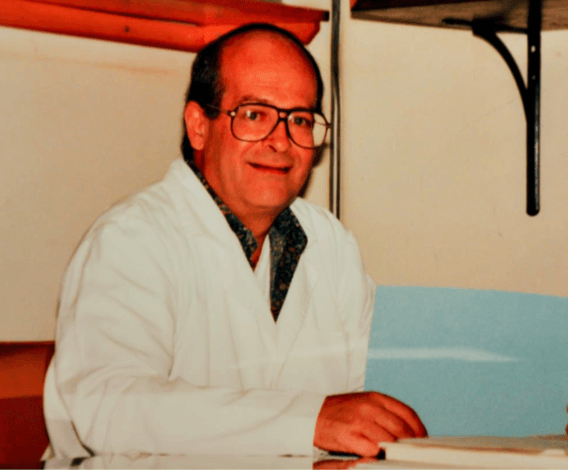
On February 16, 2007, The Ramon de la Fuente Institute of Psychiatry lost one of the founding researchers of the Directory of Neurosciences Research with the death of Dr. Calvo.
Dr. Calvo was born in Mexico City in 1946, and he studied surgery at the Autonomous University of Mexico (UNAM) where he graduated as a surgeon in 1972. Early on, he was part of the investigative team headed by Dr. Augusto Fernandez Guardiola, who was working at this time at the National Institute of Neurology and Neuroscience of the Health Secretariat. After graduating, he became a research resident at the University Claude Bernard in Lyon, France, with the group of professor Michel Jouvet. He returned to Mexico at the end of 1974 and entered Dr. Guardiola’s group as a researcher at the National Institute of Neurology assigned to the brain research unit. At this time, he was also part of the teaching staff of the Psychology School of UNAM.
In 1984, he received his doctorate in physiological studies from the Biomedical Research Institute of UNAM. His doctoral thesis contained the study of the paradoxical sleep activity of a cat (Felis catus), and the generative processes of the rombencephalon and propagation of the thalamic, visual and limb systems. This doctoral work defined his line of research with an important addition that included the limb system to the sleep generative mechanisms, specifically to those related to the rapid ocular movements. Aside from the thesis, the results of the experimental research (Phasic Activity of the Basolateral Amygdala, Cingulate Gyrus and Hippocampus during REM Sleep in the Cat) were summarized in an international journal Sep (7, 202) in 1984.
In that same year, Dr. Calvo entered the Mexican Institute of Psychiatry in the division of Neurosciences where he was named chief of the Cronobiology Department. He received a Fogarty scholarship for a postdoctoral residency in the laboratory of Professor Allan Hobson at the Massachussets Mental Health Center of the School of Medicine at Harvard University for the years 1990 and 1991. At this time, he published works that are fundamental references for sleep physiology:
Datta,S., Calvo, J.M. Quattrochi, J. and Hobson, J. A.: LONG-TERM ENHANCEMENT OF REM SLEEP FOLLOWING CHOLINERGIC STIMULATION. Neuroreport 2: 619-622, 1991.
.Datta, S. Calvo, J. M. Quattrochi, J. and Hobson, J. A.: CHOLINERGIC MICROSTIMULATION OF THE PARABRACHIAL NUCLEUS IN THE CAT: I. IMMEDIATE AND PROLONGED INCREASES IN PONTO-GENICULO-OCCIPITAL WAVES. Arch. Ital. Biol., 130: 623-284, 1992.
Calvo, J. M. Datta, S. Quattrochi, J. and Hobson, J. A: CHOLINERGIC MICROSTIMULATION OF THE PARABRACHIAL NUCLEUS IN THE CAT: II. DELAYED AND PROLONGED INCREASES IN REM SLEEP. Arch. Ital. Biol., 130: 285-301, 1992
Hobson, J. A., Datta, S. Calvo, J. M. and Quattrochi, J. ACETYLCHOLINE AS A BRAIN STATE MODULATOR: TRIGGERING AND LONG-TERM REGULATION OF REM SLEEP. Prog. Brain Res. 98: 389-404, 1993.
Dr. Calvo later developed and consolidated his working group with emphasis on the development of pre- and postgraduate students.
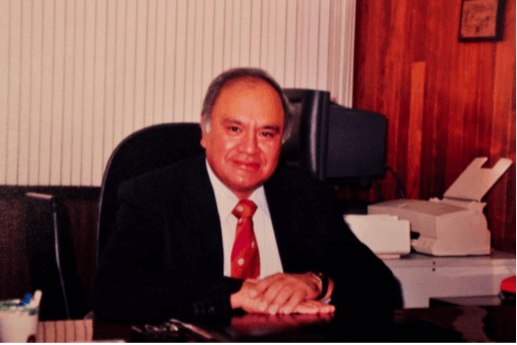
Dr. Diaz did his undergraduate and postgraduate studies at the School of Medicine at the Autonomous University of Mexico (UNAM) and graduated as a surgeon in 1966 and as a psychiatric specialist in 1970. In 1972 and 1973, he studied for his Master’s Degree in medical psychotherapy and then specialized in group psychotherapy in 1976 and 1977.
At the UNAM School of Medicine, he has been a technical and university advisor, member and secretary of the international council of the postgraduate studies division, mental health program coordinator, and teaching coordinator and head of the Psychiatry and Mental Health Department.
In 1967, he started teaching as an assistant professor of medical psychology at the School of Medicine of UNAM and is presently a full-time professor. The main courses taught by Dr. Diaz are clinical psychiatry, introduction to humanistic medicine, biological basis of conduct and undergraduate medical psychology, and subjects in psychopathology of the psychiatry specialization, clinical psychology of the family and community medicine specialization and group psychotherapy medical Masters.
His professional experience outside of UNAM started in 1967 as head of teaching and services in the Floresta Psychiatric Hospital. He was teaching coordinator in the Mexican Center for Drug Addiction and Mental Health Studies. Later, he was the head of educational projects at the Mexican Institute of Psychiatry, which is known presently as Ramon de la Fuente Muniz National Institute of Psychiatry.
He has written and co-authored more than 90 research articles published in national and international scientific journals and 23 informational articles. He has also written and co-authored 26 medical books. His publications have been referenced 280 times. He has directed and been counsel on 34 specialty theses and 4 undergraduate. He has participated in 10 master’s theses. He has conducted 400 lectures in national and international congresses and academic events of his specialty.
His participation until 1995 in more than 75 research projects on the analysis of the factors that influence the academic performance of university students, clinical studies in the area of emotional disturbances, evaluation of emotional reactions to natural disasters such as the 1985 earthquake, consumption of dependent substances in the general and student populations and electroencepholografia in mental disorders. He has been a responsible researcher in projects that include the early identification and treatment of alcoholic students. At present, he is the responsible researcher for identification of risk factors and preventative measures for alcohol consumption among university students in Boston, Massachusetts, and UNAM. He is the head of the investigation project Sexual and Interfamily Violence.
Dr. Diaz has been awarded the following distinctions and recognitions: Distinguished Visiting Professor by the San Simon University in Cochabomba, Bolivia, 1988; The Alfonso Robinson-Bours Award in Educational Medicine in 1992 by the Mexican Health Foundation; Manual Camelo Camacho Psychiatry Award 1995; personalized inscription in the Ramon de la Fuente Auditorium in Toluca , State of Mexico, 2002; personalized inscription to the Carlos Darwin neuroscience classroom in Zacatecas, Zacatecas; personalized inscription in the library of the Medical Physcology, Physchiatry and Mental Health of the UNAM Medical School 2007; Dr. Ramon de la Fuente Muniz Award for medical merit 2009.
Dr. Diaz was past president and is presently a board member of the National Academy of Medicine.
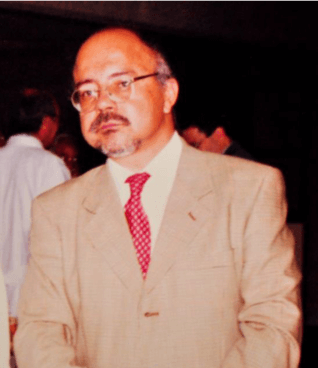
Dr. Ortega was born in Mexico City on February 26, 1954. He studied surgery at the UNAM School of Medicine from 1972 to 1978, and studied psychiatry at the Psychiatry and Mental Health Department of UNAM. He was a resident at the Psychiatric Hospital (HPFBA) of the Secretary of Health from 1980 to 1983 and was certified in 1985 by the National Council of Psychiatry. He also did a residency in psychiatry in 1984-84 and a residency of clinical investigation in 1984-86. He received a master’s degree with honors in 1996 from UNAM (National Institute of Nutrition Salvador Subiran/IMP).
Since 1985, he belonged to the APM in different relevant positions and was Editor-in-Chief of the Psychiatry magazine. He was a member of various national and international college and academy associations. He was very important in the formation of generations of psychologists and psychiatric medical specialists and under-graduate and post-graduate students from the time he was an assistant professor in the HPFBA. He instructed students in various universities in Mexico City (UNAM, UVM, etc.) and became a tutor in undergraduate and postgraduate studies of the Psychiatry and Mental Health Department of UNAM and the Ramon de la Fuente National Institute of Psychiatry. He was a member of various national and international college and academy associations.
He directed 13 undergraduate theses, 62 specialty theses and 6 master’s thesis. He also worked as a judge of CONACYT research projects from 1984. He spent most of his professional life in the INPRF and became an “A” researcher and founder and coordination of the schizophrenic clinic.
As a result of his research in the area of neurosciences, he presented more than 110 papers, took part in 161 conferences and multiple workshops worldwide, published 48 articles in newspapers and magazines in the areas of:
He dedicated his last works to the publications the following books:
Dr. Ortega received several recognitions as a student, professor and investigator.
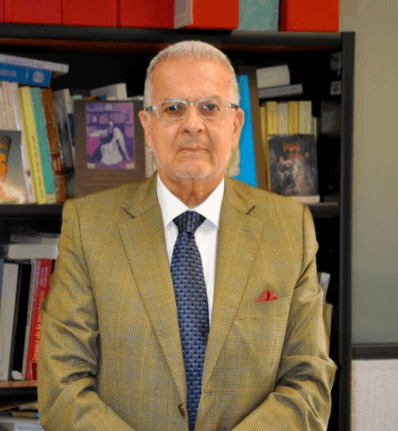
Dr. Perez-Rincon Garcia studied at the UNAM School of Medicine, and specialized in psychiatry at the University of Paris. He has been the editor of the official mental health magazine (CEMEF, CEESAM, IMP, INPRFM) since 1987. He has been a professor in the School of Medicine of the Psychiatry and Mental Health Department of UNAM, head of the Publications Department (Educational Direction) of the Ramon de la Fuente Muniz National Institute and coordinator of the library of Psychology, Psychiatry and Psychoanalysis of the Editorial Fondo de Cultura Economica.
He has been vice-president of the International Expression and Art Therapy Psychopathology Society. He has been an invitational professor at the University Complutense of Madrid and the Rene Descartes University of Paris. He has been assigned to the psychiatric service of the National Institute of Neurology and Neurosurgery for 14 years. He is a titled member of the National School of Medicine (Mexico) and a foreign member of the Reial Academia de Medicine de Catalunya of the Real Academia Nacional de Medicina de Madrid. He is also a member of other international medical, scientifcic and humanity societies. He is an honorary professor of the Instituto de Psiquiatras de Lengua Espanola (Madrid) and a member of the Instituto Europeo de Cultura (Venice). He is a knight of of the l’Ordre des Arts et Lettres (France). His fields of academic and research activity are in the history of psychiatry, psychohistory, psychopathology, psychopathology of expression, and the medical humanities. He has written books, articles, chapters and conferences on these themes in Spanish, English, French, Italian and Portuguese. He received the Ramon de la Fuente Muniz Mental Health Award in 2015 from the Council of General Health of the SSA.
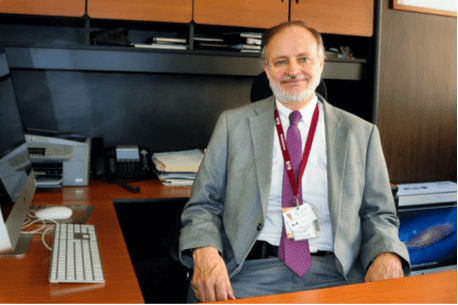
Dr. Berlanga, who was born in Mexico City, is a surgeon with specialties in psychiatry from UNAM.
In 1999, Dr. Berlanga received the Manual Camelo Award from the Manual Camelo Foundation for his work in clinical psychiatry and psychopharmacology. Since 2007, he has been an associate director of clinical investigations in the Ramon de la Fuente Muniz National Institute of Psychiatry. Previously, he was a research coordinator in the clinical service area of the same institute and was named Investigator in Medical Sciences, level D, by the Coordination Commission of the National Institute of Health. He is a professor in the Advanced Studies Division of the Medical School of UNAM where he teaches clinical neuropsychopharmacology as part of the psychiatry area. He is also a tutor in the area of psychiatry in the master’s program.
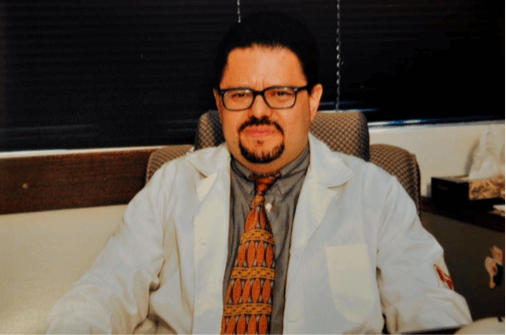
MEDICAL RESIDENCE IN PSYCHIATRY:
Spanish Hospital of Mexico, March 1986 to March 1988
Mexican Psychiatry Institute, February 1985 to March 1988
Exam by the Mexican Psychiatry Board passed with honors (Certificate No. 3410838)
DOCTORAL STUDIES:
Received, with honors, a doctorate in Medical Science from the UNAM Medical School. Tutor: Dr. Juan Ramon de la Fuente
POSTDOCTORAL STUDIES:
National Institute of Health, Medical Genetics Training Fellowship at the Neuropsychiatric Institute of the University of California, Los Angeles (UCLA). Tutor: Dr. M. Anne Spence.
Fellowship in the Human Genome, UNESCO/TWAS, Department of Molecular Biology, Universidad Autonoma de Madrid, Spain.
Academic Conferences by Invitation:
University of California, Los Angeles.
Miller School of Medicine, Miami,US
Texas Technical University, El Paso, US
Institute of Psychiatry, Sao Paolo, Brazil
University of Tours, France
Hospital Ramon and Cajal, Madrid, Spain
TEDxDF Conference, Mexico
Researcher for the National Health Institute Council assigned to the Psychiatric Hospital and National Institute of Genomic Medicine since 2013.
Researcher, Level III, of the National System of Investigations (SNI)
Counselor of the Technology and Science Institute of the Federal District (Mexico) from January of 2010 to December of 2012
Postgraduate professor and tutor of medical and odontological sciences at the UNAM Medical School since 1988.
Postgraduate professor in genomic sciences at the UNAM in Mexico City from 2004
Member of the Mexican Academy of Medicine.
Editor of the CNS Spectrums Journal (in Spanish) since 2009.
Associate editor of the Clinical Research Journal of the National Institute of Health since 2014.
Member of the editorial committee the Annals of Clinical Psychiatry, current psychiatric reviews, CNS spectrums, Notitac, Revista Brasilera de Psychiatry, International Journal of Neuropsychopharmacology, International Journal of Psychiatry.
THESES
Completed (45): 7 undergraduate, one associate, 2 internal investigation, 5 master’s program, 14 specialties (Psychiatric Residence). 8 doctorates.
DIRECCIÓN DE TESIS:
PUBLICACIONES:
PUBLICACIONES SELECTAS:
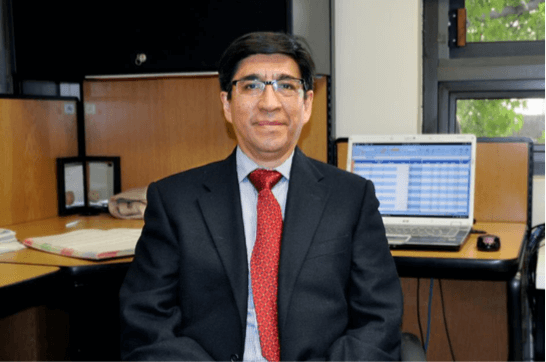
Dr. Cruz Fuentes is a doctor of basic biomedical research, and conducts research on the complex interactions of the biological-genetic and environmental factors and how they affect the expression of diverse psychiatric disorders.
He has 20 years of experience in this field, and he has covered the study of the genetic variability of disorders, such as alcohol dependency, obsessive-compulsive, depression and ADHA. Along with the effort of other fellow researchers, advances have been made in the field of genetic epidemiology of mental disorders in adolescents and in the study of the effects of molecular-biological, clinimetric and psychophyisologic responses to anti-depression medications.
Recently, Dr. Cruz Fuentes has directed his professional interest to the analysis of the epigenetic regulation mechanism related to the stress and/or early adversity effect in the development of problems in the area of internalized disorders. All this research has been reported in well-known scientific publications.
In addition to these achievements, he has aided and guided in the development of many professionals in the fields of mental health and psychiatry.
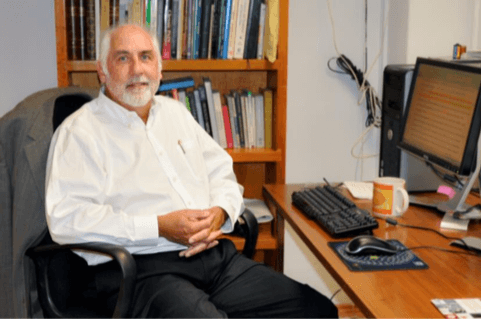
Dr. Pellicer was born in Mexico City on September 19, 1956. He received his medical degree in surgery from the Mexican School of Medicine, La Salle University (1975-1980). He received his Master’s degree in physiological sciences from the academic area of the professional and postgraduate section of the Science and Humanities College (UACPyP-CCH), Biomedical Research Institute, UNAM (IIB-UNAM). He graduated with honorary mention and received the Gabino Barreda Medal from the University Merit Commission (UNAM). He also received his doctorate in physiological sciences at UACPyP-CCH, IIB UNAM, and was distinguished as one of the top three recipients.
Since 1986, Dr. Pellicer has been a member of the National Researchers System. He has received various distinctions, among which was the Indivisa Manent Award given by the Student Council of La Salle University in 2002, and the Manuel Camelo National Psychiatry Award in October of 2002. Recently, he was named a visiting professor of the University del Rosario, Bogota, Colombia. In 2012, he was a founding member of the Bioethics University Program of UNAM.
At present, he is the Director of Neurosciences Research of the Ramon de la Fuente Muniz National Institute of Psychiatry. He is an “F” researcher for the Commission of the National Health Institute of the Health Secretariat. His field of research is related to the integrative physiology of persistent pain by means of electrophysiologic, neurochemical and conduct experimental approaches, as well as the neurobiological study of the conscience.
Another field of interest is neuroethics with emphasis on animal investigation and treatments related to mental health.
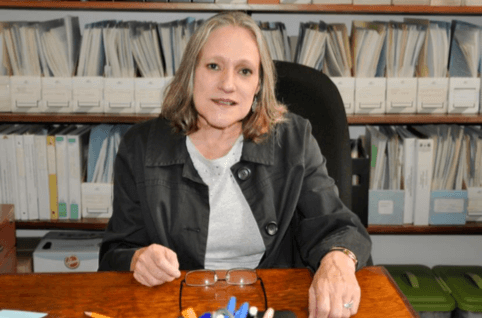
EDUCATION:
Bachelor’s Degree in Biology, School of Sciences, UNAM, Mexico City, 1981
Master’s Degree in Biochemistry, School of Chemistry, UNAM, Mexico City, 1986
Doctorate in Basic Biomedical Research, Academic Unit of the Professional and Postgraduate Cycles of the Sciences and Humanities College ( UACPyP- CCH), Mexico, 1990
POST-DOCTORAL STUDIES
Center of Neurochimie, Institut National de la Sante et de la Recherche Medicale (INSERM), U. 338, Strasbourg, France, 1990 – 1991
Unite de Recherches en Imagerie Quantitative Appliquee aux Regulations Neuroendocriniennes, Institut National de la Ante et de la Recherche Medicale (INSERM), U.339, Paris, France, 1993 – 1995
SCHOLARSHIPS:
General Direction of the Academic Personal Improvement Program (Master’s) UNAM, Mexico, 1982 -1985.
National Council of Science and Technology (Doctorate) CONACyT, Mexico, 1986- 1987.
“Poste-Vert” Postdoctoral, INSERM, France and additional postdoctoral scholarship (CONACyT),Mexico, 1990-1991.
“Poste-Vert” Postdoctoral, INSERM, 1993-1995
PROFESSIONAL EXPERIENCE;
Full-time “B” Researcher. Research Center on Genetic Engineering and Biotechnology (CEINGEBI), UNAM, Cuernavaca, Morelos, Mexico, 1987-1989
Full-time Associate Professor “C”, Department of Physiology, School of Medicine, UNAM, Mexico, 1991-1993.
Full-time Associate Researcher “B”, Clinical Investigations Division, Mexican Psychiatric Institute (IMF), Mexico, 1996.
Full-time Principal Researcher “A”, Head of Endocrinology Department, Clinical Research Division Mexican Psychiatry Institute (IMP), Mexico 1996.
Full-time Researcher “B”, Head of the Endocrinology Department, Clinical Research Sub-Division, Ramon de la Fuente National Institute (INP), Mexico, 1993-2003.
Full-time Medical Science Researcher “E”, Head of Department in Medical Area “A”, Sub-Division of Clinical Research Department of Neurochemistry, Ramon de la Fuente National Institute of Psychiatry (INP). Mexico, 2003 to present.
HONORARY DISTINCTIONS:
Candidate for National Investigator, National System of Researchers (SNI), 1987-1990.
National Level I Investigator, National System of Investigators (SNI), 1990-2009.
“Gabino Barreda” Medal Recepient, Doctorate in Basic Biomedical Research (UACPyP-CCH), UNAM, Mexico, 1992.
National Level II Investigator, National System of Investigators (SNI), 2010-2018.
AWARDS AND RECOGNITIONS:
Carso Group Award in Organ Transplant 1994, Mexican Foundation for Health, Mexico, 1995
Dr. Manuel Camelo Award 2003, Dr. Manuel Camelo Fund of the Ramon de la Fuente National Psychiatry Institute (INP) 2003.
Recognition for Ten Years of Service at the UNAM, Mexico, 2010.
MEMBERSHIPS:
Member of the Mexican Society of Physiological Sciences, A.C., Mexico, since 1999.
Member of the Society for Neurochemisty, since 2005.
Member of the Society for Neuroscience, since 2003.
Member of the Mexican Society of Biochemistry, A>C>, Mexico, since 2005
Member of the Latin American Society for Biomedical Research on Alcoholism (LASBRA), since 2010.
Founding Member of Neurobiology Branch of the Mexican Biochemistry Society, A.C., Mexico, since 2015.
OTHERS:
Tutor of Doctorate Studies in Biomedical Sciences, Institute of Cellular Physiology, UNAM, since 2002.
Tutor of Postgraduate Studies in Biological Sciences, Medical Institute, UNAM, since 2003.
Tutor of Master’s and Doctorate Programs in Psychology, School of Psychology, UNAM, since 2009.
Adaption and Translation of learning material for the teaching and dissemination of neurosciences in Mexico: “Neurobiology of Alcoholism”. Agreement, Society of Neuroscience, Mexican Society of Physiological Sciences and TV, UNAM, 2007.
Canal Once Interview: “Study of alterations at cerebral level for consumption of alcoholic beverages” by Karina del Angel, Once Noticias, November 24, 2009.
FINANCINGS
International Agreements: 3
Publications: 46 (38 international and 8 national)
Publications in process: 7 (6 international and 1 national)
Chapters in Books: 4 (3 international and 1 national)
International Book Editorials: 1
Published Quotes: 523 (119 revisions, 3 editorials) 1987 to 2013
Congresses: (5 international and 65 national)
Theses Directed: (1 doctorate, 2 master’s, and 4 undergraduate)
Theses in process: (1 doctorate and 6 undergraduate)
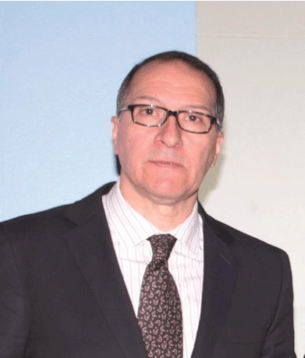
Dr. Guilherme Borges received his psychology degree from UNAM in 1980. He was a resident in Public Health at the Oswaldo Cruz Foundation of Brazil in 1982-83. He received a doctorate in Epidemiology from the National Institute of Public Health, Mexico, 1996. He was a doctoral resident at the Johns Hopkins School of Public Health, and had a post-doctoral affiliation with the Harvard Medical School in 1997-98 and was an invited researcher at the Harvard School of Public Health in 2007-08. He is an “F” researcher of the highest rank at the Ramon de la Fuente National Psychiatry Institute (INPRF). He is one of the top professors at the Metropolitan Autonomous University (UAM) and is a mentor in doctoral programs at the National Health Institute (INSP) and at UNAM. He has directed 41 undergraduate and postgraduate students in areas related to psychology, epidemiology, social medicine and public health. He has published more than 318 articles in arbitrated journals and book chapters in Spanish and English, mainly in the area related to substance and alcohol abuse and its psychiatric epidemiology with more than 10,000 references.
For many years, the principal area of his research has been how alcohol and drug consumption relate to many medical and social problems, such as violence, suicide and injuries. Dr. Borges has gathered and analyzed data from emergency rooms in Mexico and other countries in America and the world. This data has been used mainly for the academic understanding of epidemiologic estimates of the association of drug and alcohol use with injuries and suicides and for the development of filtering measures in the emergency rooms of minority group areas. With the results of his findings, he has also researched psychiatric nosology (substance use disorders). He is also heavily involved in research of the epidemiology of the psychiatric disorders (including substance abuse) with special emphasis in the study of suicide and mental health services in the context of the Psychiatric Epidemiology International Consortium of the World of the School of Mental Health., which includes national surveys in homes in more than 20 countries. Dr. Borges has a great interest in the subject of immigration and mental health, particularly regarding suicide, alcohol and drug consumption, especially among Mexicans migrating to the United States.
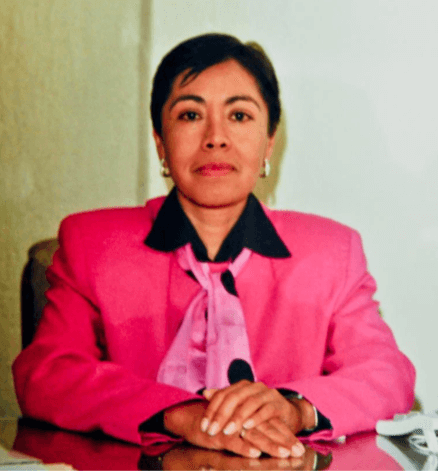
At present, she is the Director of Tutoring and Mentoring at the Benemerita Universidad Autonoma de Puebla (BUAP). Her unit is in charge of the well-being of more than 70,000 students, coordinating 0physical and integral health programs, and advising and tutoring academics.
She is a surgeon and midwife from the BUAP, graduating with honors. She is licensed in psychology from UNAM, graduating first in her class, and has a master’s and doctorate in medical sciences from UNAM, graduating with honorable mention in both grades. She studied at the post-graduate level at the Internal Medicine Department of Yale University, 1996-1997, and is a graduate and under-graduate professor at BUAP since 1987 until present. Since 1997, she has been a post-graduate professor of Medical Sciences at UNAM.
Her work in research began in the area of psychological aspects of patients with cancer (prevalence of psychiatric disorders, pain treatment and quality of life).
She has participated in and done research on clinical evaluation in psychiatry, the disability associated with mental disorders and attention deficit disorder. She has also collaborated in clinical and epidemiologic research with international organizations.
She has coordinated with Dr. Steve Lopez of the Southern California University for the past seven years on international mental health training and research programs (Minority Health International Training).
She has published more than 100 articles in national and international journals and several book chapters.
She has directed more than 100 theses for under-graduate and post-graduate in psychology and medicine for various universities.
She has been a member of the Investigation Committees of the Dr. Juan N. Navarro Psychiatric Hospital and Puebla Children’s Hospital and the Northern General Hospital of the city of Puebla.
She has been a member of the editorial committee of the Mental Health Journal of the Ramon de la Fuente National Psychiatric Institute, and she was the editor of the Pscyhiatry Review, Official Diffusion Publication of the Mexican Psychiatric Association.
She has reviewed indexed research articles for national and international journals.
She was the first woman to be member director of the Mexican Council of Psychiatry. She was also secretary-treasurer and president of the council.
Since 2003, she has been a member of the National System of Researchers.
Since 2001, she has been a member of the National Academy of Medicine and, at present, is the only woman psychiatrist and woman doctor member from Puebla.
She was awarded the Puebla State Award in Science and Technology in 2008.
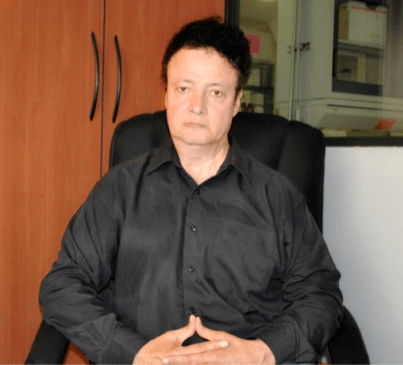
Dr. Benito Anton received the Manuel Camelo Award in 2006 as a result of his scientific accomplishments.
He has been recognized for his pioneering work related to the development of the molecular design of the synthesis and pharmaceutical formulation of the first vaccine for potential clinical use against heroin and other addictive opiates such as morphine, oxicodone, hydrocodona and desomorphine. At the time of this vaccine development, Dr. Anton received significant financial support, both nationally and internationally, for his experimental work. This support made it possible to build different laboratories and functional infrastructure, and to develop sufficient human resources at the technical and scientific level needed to form the Anti-addiction Vaccine Development Unit at an institutional level. The invention of the RAMOR-MTT vaccine was submitted for patent registry at the intellectual property level in 70 countries of which 55 have awarded patent recognition. This registration gives the INPRF and Dr. Anton world-wide recognition for the innovative pharmaceutical treatment for opiate addiction. It also gives exclusive rights to the production of pharmaceutical sales of this vaccine until the year 2030.
Other vaccine models against drug addiction of high prevalence and potency have been developed at the preclinical level by Dr. Anton and his institutional research group. These include vaccines against cocaine, nicotine and anfetamines.
The preclinical development platform of the anti-addiction vaccines developed by Dr. Anton and his institutional research group is owner of INPRF, and has been developed so it may be technologically transferred to international pharmaceutical companies to achieve the certified pharmaceutical production of these vaccines and its anti-addictive clinical use.
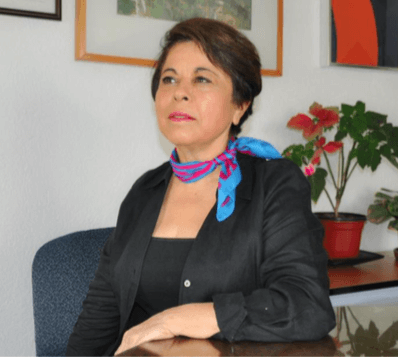
She studied psychology at UNAM and master’s studies in social psychology at the Iberoamerican University (Mexico) and master’s studies in science with a specialty in education at the CINVESTAV. She is a candidate for a doctorate degree in anthropology at the National School of Anthropology and History (ENAH). At present, she is director of epidemiologic and psychosocial research of the Ramon de la Fuente Muniz National Psychiatric Institute.
As a researcher in the field of mental health, she has developed several projects related to addictions, family, violence amongst couples and mental health.
She has done research in rural, indigenous and urban zones, and has represented the National Institute of Psychiatry in several international conferences with experts in the field.
For her accomplishments, she has received recognition from the National Ramon de la Fuente Institute of Psychiatry.
She is and “F” researcher in medical science named by the Coordinating Commission of the National Health Institute and specialty hospitals.
She is a Level III researcher of the National System of Researchers (SNI).
She is a tutor, teacher and member of the academic committee and subcommittee of the master’ and doctorate programs of the School of Medicine (UNAM), and also a postgraduate teacher and member of the technical council of the School of Psychology (UNAM). She has graduated students with undergraduate, master’s and doctorate degrees.
She was an invited researcher in the United Kingdom (Exeter and Birmingham), Finland and Mexico (CRIM – UNAM).
She has published more than 200 scientific articles in national and international journals, as well as three international books. She has conducted more than 350 national and international conferences.
She has developed intervention strategies for addictions and mental health.
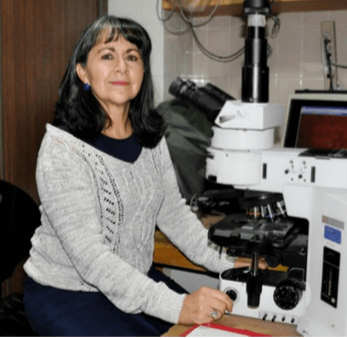
Dr. Leon was born in Mexico City. She received her medical degree and her Master’s and doctorate degrees with honors from the School of Medicine, UNAM. She has been a researcher in the department of the Functional Neurosciences Research Division of the Ramon de la Fuente Muniz National Psychiatry Institute for 30 years and, at present, is a director. She has more than 50 scientific publications. Her field of research is in functional neuromorphology with a focus on genetic and filogenetic studies of the neurotransmitters such as opiate peptides and nitric oxide. At present, her focus has been on the study of the neurotoxic effect of the organohalogens environmental contaminants used as flame retardants. In this area, she collaborates closely with Dr. Margarita Curras of the University of California, Riverside, and various projects are financed by UC-MEXUS/CONACYT.
She was a professor of cellular biology at the School of Medicine of UNAM from 1975 to 1995. At present, she is a postgraduate professor of the School of Medicine and the School of Sciences at UNAM, and an external academic tutor of social services for various postgraduates, such as the CINVESTAV and the Technological of Monterrey. She has taught students at the postgraduate, Master’s and doctorate levels.
She is a member of the National Researchers System since 1990.
She has received various awards, one of which is the Maximiliano Ruiz Castaneda Award for basic research, entitled “Immunolocalization of the NA+K+2CL Cotransporter in Peripheral Nervous Tissue of Vertebrae” awarded by the National Academy of Medicine in 2001. She won first place in the second annual Paul Janssen Award in the neuroscience category for her published work, entitled: “Nitricoxide Synthesis Inhibition during Synaptic Maturation Decreases Synapsin Immunoreactivity in Rat Brains” (Sanches-Islas, S.E., Leon Olea, M., Nitricoxide: Biology and Chemistry, Vol.. 10: 141-149, 2004.) In 2008, she was awarded the Dr. Manual Camelo Award by the Dr. Manuel Camelo Foundation, and the Annual Distinction Award for most distinguished researchers from the National Institute of Psychiatry.

Dr. Lara Cantu is a Level III Researcher of the National Research System of CONACYT and a Level E Researcher in medical sciences for the coordination committee of the National Institute of Health and for specialty hospitals.
Her main areas of research are related to gender, depression in women and pre-natal depression. She has published 83 articles in scientific arbitration journals, 11 books and 20 national and international book chapters. Her work has been referenced in 1200 publications and, as a result of this work, she has been invited to participate as an expert in 154 national and international congresses. She was a lecturer 105 times at universities and government organization.
She has participated in research groups at the George Washington University (Washington, D.C., USA), the National University of Education (Madrid, Spain), the World Organization of Health (WHO) and the Panamerican Health Organization (OPS) among others. She has been invited to participate as a counselor in research projects at the Harvard Public Health School, (Boston, MA.) and the University of California (UC Davis) in the United States.
Since 2001, she has been a teacher and a tutor of the Master’s and doctorate programs in health, medical sciences and odontology of the post-grade psychology program of UNAM. Under her guidance, 30 students of different universities have received graduate and postgraduate degrees. In 2002, She received the Alfonso Caso Medal as the most distinguished graduate of the Health Sciences Program of UNAM, and the Dr. Manual Camelo Award for her research career at the Ramon de la Fuente Muniz National Institute of Psychiatry in 2009.
Her project for the prevention of depression in women is an example of the transfer of knowledge. It includes an on-line course that has been taken by approximately 1000 professionals and given to more than 30,000 women that do not have medical attention for mental health in Mexico and other countries. A component of this program is the informative book, entitled: “It is Hard to be a Woman”, which serves as a guide for depression and has been copied 59,500 times.
She has written and collaborated in the design of on-line self-help programs, such as: help for depression (ADEP), without depression, drink less, and support programs for drug abuse and depression (PAADD).
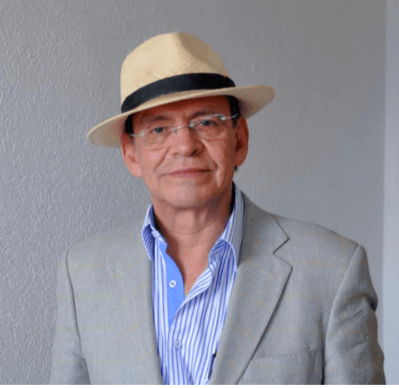
Dr. Caraveo completed his pre-university studies at Colegio Tepeyac where he played American football. He was a “Friar” with a “give it all” competitive spirit. In 1968, he began his studies at the UNAM School of Medicine, and lived by the motto “The Spirit will speak for my race”.
He graduated as a surgeon in 1974. He began working at Floresta Hospital and started his career studying mental patients. Three of his professors during this time were Dr. Rafael Fouilloux, Dr. Miguel Krassoievich, and Dr. Javier Arteaga.
He was first in his class as a psychiatry specialist at the UNAM School of Medicine in 1978. In the same year, he started working in epidemiologic research at the hospital now known as the Dr. Ramon de la Fuente Muniz National Institute of Psychiatry.
In 1980, he received a scholarship from WHO to study social psychiatry and epidemiology which made it possible for him to study in different universities throughout the world.
In 1981, he received a Master’s degree in public health from the School of Public Health in Mexico.
His interest in understanding human beings lead to his becoming a specialist in psychoanalysis at the institute founded by Erich Fromm with studies recognized by the School of Medicine, UNAM.
In 2005, he received his doctorate degree in the health science area of public mental health with honorary mention.
He has been an undergraduate and postgraduate professor at the School of Medicine, UNAM, from 1975 to present, and entered the Researchers National System in 1987.
He is a member of the Mexican Institute of Psychoanalysis, a founding member of the Mexican College of Psychotherapy , and a member of the International Consortium of Psychiatric Epidemiology, first generation.
He has written 70 research articles, 19 articles on knowledge dissemination, 25 book chapters and co-authored the book “Mental Health in Mexico”.
In 2001, he received the second place award for General Coordination of National Health Institutes in the area of public health research and social sciences for his work titled “Symptoms, Perception, and Demand for Attention of Mental Health in Children and Adolescents in Mexico City”.
In 2006, he received the award for the best doctorate thesis from the General Coordination of National Health Institutes for his work on the research in public health and social sciences.
He has received substantial financial aid for his major research projects and, at present, is being supported by the ICYTDF in the development of an epidemiology program for children and adolescents in health centers.
Dr. Caraveoy’s work has included clinical effort, teaching and research.
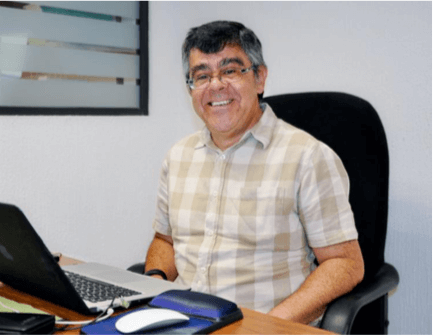
Dr. Mondragon studied biology at the Metropolitan Autonomous University (UAM), Iztapalapa.
He received his Master’s degree in psychobiology at the School of Psychology, UNAM, and his doctorate degree in biomedical sciences from the Institute of Neurobiology, UNAM, Juriquilla Campus.
He is a founding researcher of the National Mexican Institute of Psychiatry. At present, he is the head of the Etiology Department of the Neuroscience Division of the Ramon de la Fuente Muniz National Institute of Psychiatry.
He is a Level II member of the National System of Researchers.
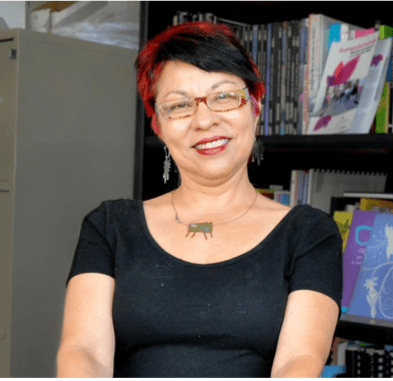
Dr. Ramos was born in Mexico City. She received her undergraduate degree from UAM-Xochimilco in 1984, and her Master’s and doctorate degrees in social psychology from UNAM both with honors. She was a postgraduate resident of the Arizona State University.
At present, she is an “F” researcher (highest category) in the Medical Sciences, Epidemological and Psychology Division of the Ramon de la Fuente National Institute of Psychiatry. She is a national researcher, Level II, of the National System of Researchers. She is also a teacher and tutor at the Master’s and doctorate programs in Public Mental Health at UNAM, a tutor at the doctorate level in the School of Psychology, UNAM, and a teacher in the specialized area of Criminology, Communication and Power, UNAM.
From 2001 to 2005, she was a teacher of victim related studies at the Master’s degree level at the National Institute of Penal Sciences, a guest professor at the Master’s degree level specializing in family violence at the University of Nuevo Leon, and a teacher at the doctorate level in psychology specializing in health and violence at the Autonomous University of Ciudad Juarez.
She has collaborated with several civil organizations in various courses and projects. She was a founder, academic coordinator and associate degree teacher in the area of violence toward children and adolescents from the human rights and health perspectives to encourage a life without violence. This effort was promoted by the Human Rights Commission of the Federal District and the National Institute of Psychiatry. She has been an academic coordinator and associate degree teacher in the area of family violence from the general therapeutic and emotional perspectives at the Division of Continuous Education, School of Psychology, UNAM.
She has directed 18 undergraduate, Master’s and doctorate theses. And has published 75 research articles, 25 informative articles, and 33 book chapters. She is co-author with Sarah Silberman of the book “Violence and the Media” and coordinated on the book “Health and Marijuana” with Jose Ramon de la Fuente. Her works have been referred to in several scientific publications, nationally and internationally. She was a consultant on the project: “Analysis of Public Policies of the Federal Government of Mexico Pertaining to the Prevention of Violence in Youth Living in High Violence Areas” with the World Bank from February to August 2009.
Since 2011, she has been a research counselor in the area of sexual harassment in the work place at the Ramon de la Fuente Muniz National Institute of Psychiatry.
Her field of interest is in the area of violence; violence in general, violence amongst young people, sexual abuse, and the psychological consequences of these to mental health.
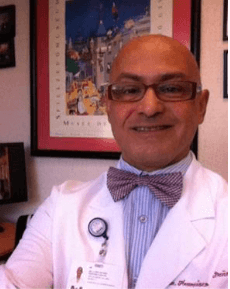
Dr. De la Pena is a surgeon and psychiatrist. He is a child and adolescent psychiatrist with a Master’s in Medical Science.
He is a medical science researcher, Level D, and the head of the Research Promotional Department of the Ramon de la Fuente Muniz National Institute of Psychiatry.
He is a member of the National System of Researchers (SNI-1) CONACYT.
He is a post-graduate professor in children and adolescent psychiatry in UNAM, and a listed member of the Mexican Academy of Pediatrics.
He is a founding member of the National Experts Group of TDAH, and also a founding member of the Latin- American League of TDAH.
From 2010 until 2014, he was a member of the work team of the WHO for the taxonomic modifications to the CIE 11 in children and adolescent ailments.
He received the award for academic excellence from the Faculty of Medicine, UNAM, 1996, and the Manuel Camelo National Psychiatry Award from the Manuel Camelo Foundation in 2013.
From 2009 until 2014, he published several works on child and adolescent psychiatry.
Publicaciones 2009-2014:
o Palacio JD, De la Peña F, Palacios L y Ortiz S, Algoritmo latinoamericano de tratamiento multimodal del TDAH a través de la vida, Rev Colmb Psiquiat 2009, 38(supl 1):35S-65S.
o Ulloa RE, Narváez MR, Arroyo E, Del Bosque J, De la Peña F, Validity of the Child Psychiatric Hospital Teacher Questionnaire for the Assessment of ADHD. Teacher’s Version, Actas Esp Psiquiatr 2009, 37(3):153-157.
o Martínez-Levy Gabriela, Díaz-Galvis John, Briones-Velasco Magdalena, Gómez-Sánchez Ariadna, De la Peña-Olvera Francisco, Sosa-Mora Liz, Palacios-Cruz Lino, Ricardo-Garcell Josefina, Reyes-Zamorano Ernestob, Cruz-Fuentes Carlos, Genetic interaction analysis for DRD4 and DAT1 genes in a group of Mexican ADHD patients, Neuroscienci Letters, 2009,451: 257-260.
o Francisco de la Peña Olivera, Gabriel Esquivel Adame, Armando Javier Pérez González y Lino Palacios Cruz, Validación concurrente para trastornos externalizados del MINI-Kid y la entrevista semiestructurada para adolescentes, Rev Chil Psiquiatr Neurol Infanc Adolesc 2009, 20(1):8-12. Francisco de la Peña, El Trastorno por Déficit de Atención con Hiperactividad (TDAH) en México y Latinonamérica: Avances y retos para el diagnóstico, el tratamiento y la investigación, Salud Mental 2009, 32(Supl1):S1-S2.
o Francisco de la Peña Olvera, Eduardo Barragán Pérez, Luis A. Rohde, Luis Rodrigo Patiño Durán, Patricia Zavaleta Ramírez, Rosa Elena Ulloa Flores, Ana María Isaac, Alejandra Murguía, Roberto Pallia, Marcela Larraguibel, Algoritmo de Tratamiento Multimodal para Escolares Latinoamericanos con Trastorno por Déficit de Atención cn Hiperactividad (TDAH), Salud Mental 2009, 32(supl 1):S17-S29.
o Comité Internacional para el Desarrollo y Estudio del Cuestionario para Escolares y Adolescentes Latinoamericanos con Trastorno por Déficit de Atención con Hiperactividad (CEAL-TDAH) Rosa Elena Ulloa Flores, Psiquiatra, México. Francisco de la Peña Olvera, Psiquiatra de Niños y de Adolescentes, México; Lino Palacios Cruz, Psiquiatra de Adolescentes, México; Silvia Ortiz León, Psiquiatra de Niños y de Adolescentes, México; Juan David Palacio Ortiz, Psiquiatra de Niños y de Adolescentes, Colombia; Eugenio Horacio Grevet, Psiquiatra, Brasil; Juan Carlos Resendiz Aparicio, Neuropediatra, México; Alejandro Olmos López, Neuropediatra, México; Ana Valdez Pérez, Psiquiatra de Niños y de Adolescentes, Chile; Ana Bertha Meza Pérez, Psiquiatra de Niños y de Adolescentes, México; Cecilia Margarita Montiel Nava, Neuropsicóloga, Venezuela; Edith Padrón Sólomon, Psiquiatra de Niños y de Adolescentes, México; Elizabeth Landeros, Psiquiatra de Niños y de Adolescentes, México; Flora de la Barra Mc Donald, Psiquiatra de Niños y de Adolescentes, Chile; Carolina Remedi, Psiquiatra de Niños y de Adolescentes, Argentina; Foad Hassan, Neurólogo, Nicaragua; Francisco Ramírez, Psiquiatra, Honduras; José Ovidio Cornelio Nieto, Neuropediatra, México; José Visoso Franco, Neuropediatra, México; Julia Ribbon Conde, Neuróloga, México; Leopoldo Rivera Castaño, Neuropediatra, México; Wellington Borges Leite, Neurólogo, Brasil; Norberto Abel Luna López, Neuropediatra, México; Norma Olga Taddey, Psiquiatra de Niños y de Adolescentes, Argentina; Octavio Ibarra León, Psiquiatra, México; Orlando Villegas, Neuropsicólogo, Estados Unidos de América; Reyna Durón Martínez, Neuróloga, Honduras; Sandra Luz Guillén Méndez, Neuropediatra, México; Diana Molina Valdespino, Psiquiatra de Niños y de Adolescentes, México; Soledad Muñoz, Psiquiatra de Niños y de Adolescentes, Argentina.), Cuestionario para Escolares y Adolescentes Latinoamericanos con Trastorno por Déficit de Atención con Hiperactividad (CEAL- TDAH). Construcción, descripción del instrumento y datos sociodemograficos de la muestra, Salud Mental 2009, 32 (Supl 1):S55-S62.
o Comité Internacional para el Desarrollo y Estudio del Cuestionario para Escolares y Adolescentes Latinoamericanos con Trastorno por Déficit de Atención con Hiperactividad (CEAL-TDAH) Rosa Elena Ulloa Flores, Psiquiatra, México. Francisco de la Peña Olvera, Psiquiatra de Niños y de Adolescentes, México; Lino Palacios Cruz, Psiquiatra de Adolescentes, México; Silvia Ortiz León, Psiquiatra de Niños y de Adolescentes, México; Juan David Palacio Ortiz, Psiquiatra de Niños y de Adolescentes, Colombia; Eugenio Horacio Grevet, Psiquiatra, Brasil; Juan Carlos Resendiz Aparicio, Neuropediatra, México; Alejandro Olmos López, Neuropediatra, México; Ana Valdez Pérez, Psiquiatra de Niños y de Adolescentes, Chile; Ana
o Bertha Meza Pérez, Psiquiatra de Niños y de Adolescentes, México; Cecilia Margarita Montiel Nava, Neuropsicóloga, Venezuela; Edith Padrón Sólomon, Psiquiatra de Niños y de Adolescentes, México; Elizabeth Landeros, Psiquiatra de Niños y de Adolescentes, México; Flora de la Barra Mc Donald, Psiquiatra de Niños y de Adolescentes, Chile; Carolina Remedi, Psiquiatra de Niños y de Adolescentes, Argentina; Foad Hassan, Neurólogo, Nicaragua; Francisco Ramírez, Psiquiatra, Honduras; José Ovidio Cornelio Nieto, Neuropediatra, México; José Visoso Franco, Neuropediatra, México; Julia Ribbon Conde, Neuróloga, México; Leopoldo Rivera Castaño, Neuropediatra, México; Wellington Borges Leite, Neurólogo, Brasil; Norberto Abel Luna López, Neuropediatra, México; Norma Olga Taddey, Psiquiatra de Niños y de Adolescentes, Argentina; Octavio Ibarra León, Psiquiatra, México; Orlando Villegas, Neuropsicólogo, Estados Unidos de América; Reyna Durón Martínez, Neuróloga, Honduras; Sandra Luz Guillén Méndez, Neuropediatra, México; Diana Molina Valdespino, Psiquiatra de Niños y de Adolescentes, México; Soledad Muñoz, Psiquiatra de Niños y de Adolescentes, Argentina.) Cuestionario para Escolares y Adolescentes Latinoamericanos con Trastorno por Déficit de Atención con Hiperactividad (CEAL- TDAH). Validez y confiabilidad temporal, Salud Mental 2009, 32 (Supl 1):S63-S68.
o Ernesto Reyes Zamorano, Eva Marcela Cárdenas Godínez, Karina Lucero García Vargas, Nizallé Coral Aguilar Orozco, Josue Vázquez Medina, Aaron Díaz Flores, Luis Alejandro Díaz Flores, Aurora Jaimes Medrano, Silvia Ortiz León, Omar Náfate López, César Enrique Gaspar Barba, Miriam Feria Aranda, Francisco de la Peña Olvera y Lino Palacios Cruz, Validación de constructo de la escala de autoreporte del TDAH en el adulto de la OMS en población universitaria mexiana, Salud Mental 2009, 32(supl1):S69-S75.
o De la Peña Olvera Francisco, Palacio Ortiz Juan David y Barragán Perez Eduardo, Declaración de Cartagna para el Trastorno por Déficit de Atención con Hiperactividd (TDAH): rompiendo el estigma, Rev Cienc Salud, 8(1):95-100, 2010
o Ulloa-Flores RE, Palacios-Cruz L, De la Peña-Olvera F. Diagnóstico y Tratamiento de la Psicopatología en la Infancia y la Adolescencia. Salud Mental 2011; 34(5): 399-401.
o Vargas A, Zavaleta P, De la Peña- Olvera F, Palacios-Cruz L. Manifestaciones Clínicas y Tratamiento del Trastorno Bipolar en niños y adolescentes, una actualización basada en la evidencia. Salud Mental 2011; 34(5): 409-414
o De la Peña-Olvera F, Palacios-Cruz L. Trastornos de la conducta disruptiva en la infancia y la adolescencia diagnóstico y tratamiento. Salud Mental 2011; 34(5): 421-427.
o Ulloa-Flores RE, De la Peña-Olvera F, Nogales-Imaca I. Tratamiento multimodal de niños y adolescentes con depresión. Salud Mental 2011; 34(5): 403-407.
o Palacios Cruz L, De la Peña F, Ulloa E, Patiño R, Calle-Portugal S, Valderrama A. Conocimientos, creencias y actitudes en padres mexicanos acerca del trastorno por deficit de atención con hiperactividad (TDAH). Salud Mental 2011; 34(2):149-155.
o Gaspar-Barba E, de la Peña F.* Neuroendocrine disturbances in pediatric population with major depressive disorder. En: de Gortari P. Ed. Psychoneuroendocrinology. Kerala, India: 2011; 1-21. ISBN:978-81-308-0461-3
o De la Peña Olvera F.R., Palacios Cruz L, Trastornos de la conducta disruptiva en infancia y adolescencia, Cap. 9 en De la Fuente JR & Heinze G, Salud Mental y Medicina Psicológica, Mc Graw Hill, México, D. F., ISBN: 978-607-02-2801-8 pp. 102-110
o Palacios Cruz L, De la Peña Olvera F, Victoria Figueroa G, Arias Caballero A, de la Rosa Muñoz L, Valderrama Pedroza A, Calle Portugal P, Ulloa Flores RE. (2013). Conocimientos y creencias sobre el tratorno por déficit de atención con hiperactividad en maestros de tres países latinoamericanos. Salud Mental, 36(4), 285-290.
o Palacios Cruz L, Arias Caballero A, Cortes Sotres F, de la Peña Olvera F, Feria Aranda M, Cárdenas Godínez M, Apiquian Guitart R, Cabrera Lagunes A, Berlanga C, Fresán A, Heinze Martin G. (2013). Asociación de los trastornos externalizados y la eda de inicio en pacientes con trastorno bipolar tipo I y II. Salud Mental, 36(3), 241-251.
o De la Peña Olvera Francisco R. y Palaicos Cruz Lino, Cap. 9, Tratonros de la conducta disruptiva en infancia y adolescencia. En Salud Mental y Medicina Psicológica 2012:102-110 ISBN: 978-4562-1073-1 Ed. Juan Ramón de la Fuente y Gerhard Heinze. México, D. F., México.
o Licona A, Palacios L, Feria M, Zavaleta P, Vargas A, Becerra C, De la Peña F. Asociación de comorbilidades y funcionamiento global en hijos de padres con trastorno bipolar. Salud Mental 2014; 37(1):9-14.
o De l a Peña F. La interfase entre la investigación en servicios clínicos y la enseñanza de la Psiquiatría. Salud Mental 2014; 37(6): 453-45
o Palacios L, Benjet C, Caballero A, Mayer P, Clark P, Cruz C, Feria M. De la Peña F. Adversidad psicosocial, psicopatología y funcionamiento en hermanos adolescentes en alto riesgo (HAR) con y sin trastorno por déficit de atención e hiperactividad. Salud Mental 2014; 37(6): 467-476
o Zavaleta-Ramírez P, De la Peña Olvera F, Vargas–Soberanis MA, Feria Aranda M, Sosa Mora L, Arias Caballero A, Becerra Palars C, Palacios Cruz L. Estudio comparativo de psicopatología en hijos de padres con trastorno bipolar. Salud Mental 2014; 37(6): 477-482
o De la Peña Olvera FR, Gómez Castro C, Heinze G, Palacios- Cruz L. Adversidad social y trastornos psiquiátricos: Estudio comparativo entre estudiantes de secundarias públicas y Salud Mental 2014; 37(6): 483-489,
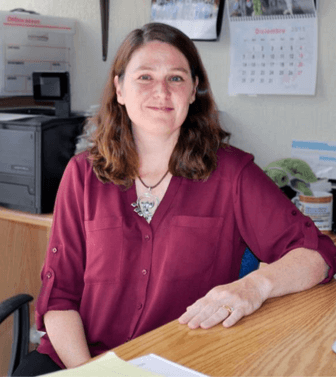
Dr. Benjet received her doctorate degree in psychology from UNAM, Mexico. She has participated in research at the Clinic for Children’s Conduct at Yale University and in the laboratory for affected disorders at Stanford University.
At present, she is a researcher in the Department of Psychosocial and Epidemiological Research at the Ramon de la Fuente National Institute of Psychiatry (INPRFM), a Level III member of the National System of Researchers, and a postgraduate tutor at the Medical and Psychology Schools of UNAM. She is the treasurer of the Mexican Society of Psychology and president of the Research Committee of the INPRFM.
Dr. Benjet participates in epidemiologic research on the mental health of adolescents and participates in international surveys related to mental health ( along with approximately 30 psychiatric epidemiology leaders of various countries) sponsored by the World Health Organization (WHO).
Her research findings have been presented in 90 publications in national and international influential scientific journals, in 12 book chapters, more than 70 conferences in scientific congresses, and have been referenced by other authors in more than 4500 publications.
In 2010, she received the Miguel Aleman Award for her accomplishments in health research, and an award for the best article in the public health area from the Coordinating Commission of the National Health and Specialty Hospitals in 2009. She also received the Scopus Award for the impact her work has had in international literature and, most recently, the Manuel Camelo award for her psychiatric research in psychiatric epidemiology in adolescents and its traumatic impact and social adversity in the psychopathology development.
In 2005, Dr. Benjet performed the first and, to date, only survey of the general adolescent population of Mexico City and its metropolitan area to identify the attention required for mental health problems and the risk factors of youths between the ages of 12 to 17. In 2013, she conducted a follow-up on these youths as young adults resulting in data on incidence, persistence and remission of the disorders as well as the economic, labor and social consequences in adulthood.
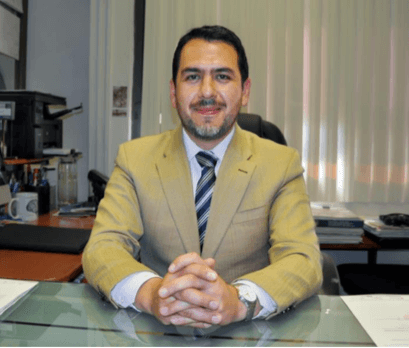
Dr. Ramirez received his Master’s and doctorate degrees from the Research Center and Advanced Studies of the National Polytechnic Institute (CINVESTAV) with a specialty in cellular biology and completed his corresponding thesis at the Ramon de la Fuente Muniz National Psychiatry Institute, Clinical Research Sub-division.
He did post-doctoral work at the Max Delbruck Center of Molecular Medicine, Trunk Cells Laboratory, in Berlin, Germany.
He did research work at the Regenerative Therapy Center (CRTD), Dresden, Germany, with Dr. Gerd Kempermann, and at the Catholic University Neurobiology and Generic Therapy Laboratoy, Lovania, Belgium, with Dr. Veerle Baekelandt.
His area of research included the following:
Hypocampic neurogenesis in the adult brain and its relation with psychiatric disorders, including molecular and cellular mechanisms, as well as the environmental and other type of interventional influence on the neuroplasticity.
Cellular and molecular biology of the mother cells of the human olfactory neuroepithelium and its possible therapeutic application.
Dr. Bernabe is a Level II Researcher of the System of National Researchers.
He has written 37 articles in international journals, has 7 publications in national journals, and 6 chapters in international books. His published works have been referenced more than 900 times.
Two of his research projects have been institutionally financed by INPRM, and two by CONACYT-SEP.
One has been financed by the international cooperation of CONACYT-German Ministry for Education and Investigation, with the assistantce of Dr. Gerd Kempermann, and one for infrastructure from CONACYT-INFRA2015.
Another project was financed by the Institute of Science and Technology of the Federal District (ICYTDF), one by the Mexican Pharmaceutical Industry, and one by CONACYT-FOSISS.
He was an editor in the following journals: Age Journal, Nutritional Neuroscience, Journal of Steroid Biochemisty and Molecular Biology 4, Neurotoxicity Research, Neuroinmunomodoulation, Psychiatry Research, Cell Physiol Biochemistry, and the Brain Research Bulletin.
He directed doctorate theses (one complete, two on-going), Master’s theses (three complete, two on-going), and undergraduate theses (six complete, two on-going).